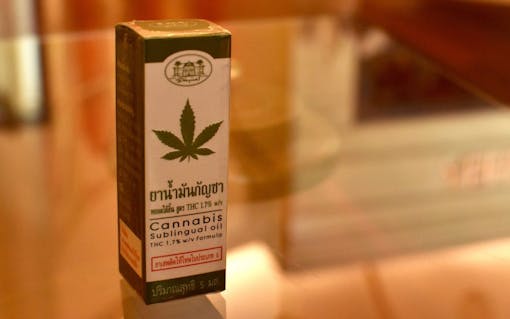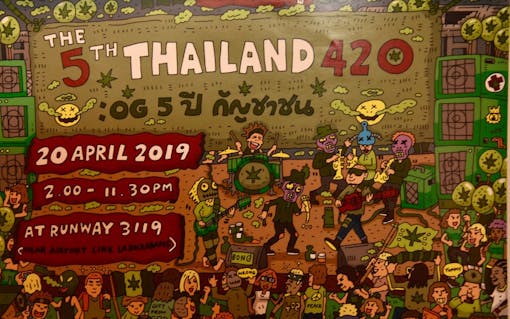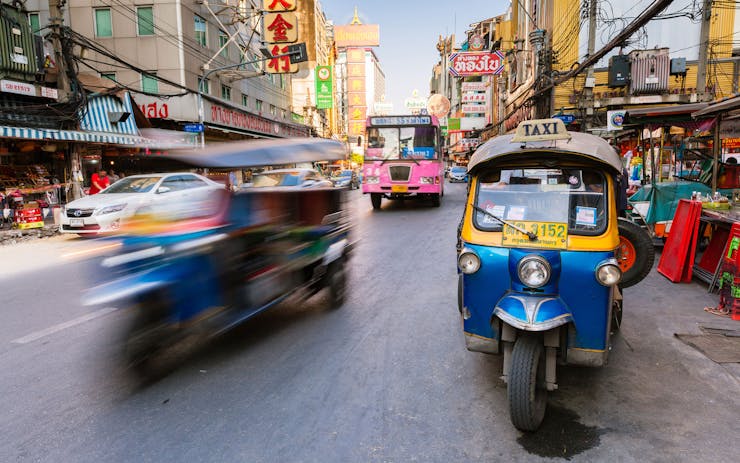Modern Asia’s first medical cannabis clinic blends into a concrete hospital complex in Prachinburi, a languid town 100 km east of Bangkok. Dotted with fish farms and shaded by tamarind trees, the muddy Bang Pakong River flows by out front. Somewhere out back, cannabis is growing.
The sublingual cannabis oils at Chao Phya Abhaibhubejhr Hospital are part of a growing openness toward cannabis in Thailand. Vendors display glass bubblers at Bangkok street markets. Pot leaves decorate hats, vehicles, and even the Health Ministry’s homepage. And a recent national survey revealed that 86% of Thai people support medical marijuana—a marked increase from a generation ago.

A tuk tuk pulls out from the herbal medicine center that hosts Thailand’s first medical marijuana clinic, at Chao Phya Abhaibhubejhr Hospital in Prachinburi. (David Luekens for Leafly)
“In the past, my dad only thought of cannabis as a narcotic drug, but now, after I’ve talked with him and he sees more about it on TV and websites, he is more accepting on this issue,” said Dr. Pakakrong “Song” Kwankhao, head pharmacist at Abhaibhubejhr’s Center of Evidence-Based Thai Traditional and Herbal Medicines.
But supporters of wider cannabis liberalization in Thailand—which operates under a military-dominated political system that oversees one of the world’s most unequal economies—remain skeptical. Early expectations that medical legalization last February would erupt into a free-flowing ganja scene, to use the Thai word for cannabis, have not panned out.
Resembling stoic Californians of the late 1990s, Thai cannabis supporters now expect a long road ahead.
“I want to start getting people thinking about what is going to be the form of cannabis in eight to 10 years,” said Chokwan “Kitty” Chopaka, CEO of Elevated Estate and a leader in Highland Network, a Bangkok-based advocacy group. “It’s very much an uphill battle, or more like rock climbing.”
Creators of the bong
Cannabis has grown wild in tropical Southeast Asia for millennia. Prior to Thailand’s prohibition on it, which began in 1935, healers sprinkled ganja into remedies to relieve nausea and relax muscles. The ban was loosely enforced for decades after prohibition took effect, allowing ganja plots to dot the watery plains and mountain slopes well into the 1970s.

Traditional bamboo bongs on display at Highland Cafe in Bangkok. The word bong comes from somewhere in the Tai family of languages, which includes Thai but also Lao, Shan, and others. (David Luekens for Leafly)
The northeastern Isaan region’s prized Thai Stick strain helped fuel the hippie movement. In 1968, one pound of Mekong valley ganja called Golden Voice sold for $1,000 on the illicit US market, according to Peter Maguire and Mike Ritter in their book, Thai Stick. In today’s money, that would be $7,370.
Noting that much of the credit for developing “Thailand’s hallmark cannabis” should go to the Nyaw, an indigenous northeastern tribe, Ritter explained that “Thai Stick was grown outdoors in loamy soil nourished by the Mekong and its tributaries.” It featured pure Thai sativa, now scarce after being bred into the Hazes and Juicy Fruits more common at Western retailers.
“We need to look at it in terms of cultural and historical preservation.”
Likely recollecting the Thai Stick era, the president of the Thai Government Pharmaceutical Organization (GPO), Sopon Mekthon, has said he wants the country to “be a leader in marijuana.” His agency controls the largest of three institutions currently licensed to produce cannabis products for medical use (the other two are Abhaibhubejhr and Udon Thani Cancer Hospital in the northeast, which has yet to begin production). The GPO facility sits beside a new Ganja Studies department at Rangsit University, north of Bangkok. “Our brand is strong,” he said in July, “and we have traditional Thai medicine knowledge that’s over 300 years old.”
But of the strains that helped Thailand build its cannabis reputation, some have disappeared. Precious genetics were lost during what Maguire and Ritter called “one of the DEA’s unequivocal victories of the war on drugs.”
Thailand started handing down harsher cannabis penalties in 1979 while under pressure from the US, beginning a period that devastated the country’s cannabis industry and coincided with the final phase of the Thai military’s war with Communist Party of Thailand insurgents. Certain cannabis production areas, such as Nakhon Phanom province, also hosted insurgent bases into the 1980s.

A view of the Mekong River in Nakhon Phanom province, once a Thai Stick production hub. (David Luekens for Leafly)
“The Thai government’s policy to wipe out cannabis cultivation dashed the livelihood, hopes and dreams for thousands of very poor people,” said Ritter. American DEA agents tracked down smugglers at sea and shared intelligence with Thai police and military units that rooted out cannabis farms and supply networks within the country, often through helicopter raids.
“Even the people who witnessed how Thai Stick was done are now aging and dying,” Kitty added. “We need to look at it in terms of cultural and historical preservation.”
A former Thai Stick smuggler himself, Ritter thinks the kingdom should start by actively preserving landrace strains. “Enthusiastic young people are already developing a new network of knowledgeable growers. Given the chance, free of bureaucratic meddling, they are entirely capable of reclaiming Thailand’s former cannabis glory,” he said.
“Our Thai landrace in itself is already wonderful,” said Kitty. “But right now, I’m not sure if the law is ever going to allow us to redevelop our strains. So decriminalization is what we need to go for first.”
A wild political ride
At the heart of the issue is a polarized, fragile political situation. The government body that voted to legalize medical cannabis late last year was not elected, but rather selected by a right-wing, Army-led junta. It took power in 2014 after staging Thailand’s 12th successful coup since 1932.
The coup’s leader, Prayut Chan-ocha, stayed on as prime minister after a March election that critics say was designed to give the junta’s new political party an advantage. Stacked with conservatives, most cabinet members oppose anything beyond a restrictive medical cannabis program—with one key exception.
Anutin Charnvirakul’s independent-minded Bhumjaithai Party ran on a platform of full marijuana legalization, plastering the kingdom with campaign posters emblazoned with cannabis leaves. Ultimately the party outperformed past showings by taking 51 seats in a 500-member lower house of parliament that represents 26 different political parties.

Abhaibhubejhr’s first batch of THC oil was made from ganja confiscated by police. (David Luekens for Leafly)
Now a member of the cabinet, Anutin is simultaneously serving as Minister of Public Health and chair of the Narcotics Control Board (NCB), which helps direct drug policy. Though constrained by various forces, including a 1961 international narcotics treaty, Anutin is leading the legalization charge from the inside.
On the campaign trail, Anutin called for legalization of six ganja plants per household. He hailed a vast new source of agricultural wealth—420,000 baht ($13,750 USD) per family, to be precise—for farmers who have struggled with drought, floods and unstable prices on rice, rubber, and other crops. He promised that farmers would earn this sum by selling their cannabis to state agencies. Or they could keep it for personal use.
The two largest left-wing parties, Pheu Thai and Future Forward, have yet to state a clear position on cannabis. Now leading the opposition, their priority is to resist military influence in politics. But they represent millions of farmers and young people, two constituencies that broadly support cannabis liberalization. For now, their power is severely constrained by 250 junta-picked senators.
“I’m not sure whether the government will stay on for long,” said Dr. Song. “If they do, they will push medical cannabis first. They’re under a lot of pressure from doctors.”
Medical motives
In early August, Anutin looked delighted as he reviewed the first 4,500 bottles of GPO-produced cannabis oils. He promised a million bottles within six months, saying “the long wait of the people has finally come to an end.” Oils came in three types: CBD, THC, and a mix of the two.
Despite the splashy photo op, the restrictive medical system has been a letdown for many, including patients who were excited in February when the Thai FDA chief said that stress might be a qualifying condition for a cannabis prescription. In June, the FDA clarified that only patients suffering from Parkinson’s disease, epilepsy, seizures, spasms, specific types of neuropathic pain, muscle atrophy, cancer, and Alzheimer’s disease will be approved for cannabis treatment.
Thai citizens enrolled in the country’s universal healthcare system get the oils for free.
Many Thai doctors support cannabis use for less severe ailments, and Dr. Song said some hospitals are already following their own in-house criteria. “There are guidelines, but it also depends on the opinions of doctors,” she said. “In some hospitals, I heard they may prescribe cannabis for migraines. One hospital is only prescribing it for spasms and nausea from chemotherapy. The attitude of the prescriber is important.”

An outdoor plot being prepared for growing locally sourced Hang Krarok sativa at Abhaibhubejhr Hospital. (David Luekens for Leafly)
Dr. Song is currently overseeing CBD oil treatment for 32 patients and THC for 20 more. All but a few report “very effective” results. After leading the way, Abhaibhubejhr is now one of 19 Thai hospitals prescribing cannabis oil. That number is expected to reach into the hundreds, eventually extending to village health clinics and folk medicine practitioners.
She thinks cannabis “can improve quality of life and reduce the workload of caregivers.” But she is also cautious, adding, “I’m concerned with cannabis being involved in every neurotransmitter, so I don’t recommend it as a front-line treatment. We’re concerned about the safety.”
After assessing patients, hospitals apply on their behalf for final approval from the Health Ministry. Thai citizens enrolled in the country’s universal healthcare system get the oils for free—no small perk considering that one bottle of CBD oil costs 900 baht (US $30) to produce, according to Dr. Song.
She added that “foreign patients do call the center, especially cancer patients, but I’m not sure, in terms of practice, if we can treat them yet.”
The wording of the law makes it clear that foreigners are indeed eligible for the program. The new Tourism Minister, Pipat Ratchakitprakan of the Bhumjaithai Party, intends to weave cannabis into “medical tour packages,” although this is unlikely until the list of approved conditions expands.
‘Rules within rules within rules’
Sublingual oil is the only medicinal cannabis product currently available, although 90 tincture recipes that include extractions of other herbs are awaiting approval. Cannabis flowers, edibles, and other types of extracts are still prohibited, part of the reason that “the black market is booming,” according to Kitty.
After starting out by processing THC extracts from cannabis seized by police, Abhaibhubejhr is now growing 16 locally sourced sativa plants from a strain called Hang Krarok (Squirrel Tail) in an indoor Aeroflo system.
The hospital is also preparing an open-air plot for Hang Krarok, as well as greenhouses for cultivating CBD-rich Charlotte’s Angel from seed provided by Dutch Passion, imported with help from Elevated Estate. (With few exceptions, Thai law still prohibits the import of cannabis seed.)
Kitty thinks Thailand has much further to go. “Sublingual oil is a very little, teeny weeny market compared to what is available now. The problem is that people who don’t have enough knowledge are in positions of power, not having a basic understanding of the plant,” she said, adding that entrenched “nepotism, corruption and bureaucracy” are not helping.

In Bangkok, Highland Cafe holds meetups to discuss cannabis every Tuesday evening. Kitty predicts that one day the cafe will become a cannabis dispensary. (David Luekens for Leafly)
“The government is monopolizing the whole process,” she went on, “and there are rules within rules within rules that make it look like the little guys can’t get in. They don’t seem to care if the public will benefit from any of this.” A look at the Thai beer scene is ominous: Thailand’s domestic beer monopoly has kept microbrewers locked out since the 1930s.
Thai rock star and cannabis advocate Add Carabao, a household name in Thailand, said “Anutin is one of us, but he appears to be a lone sheep surrounded by foxes hungry to feed their vested interests.”
Ritter believes “the Nyaw people and other small-scale farmers of the northeast should benefit first,” but they may be left out of a medical cannabis industry that Prohibition Partners estimates will be worth US $237 million by 2024. Throw in legal adult-use sales, and Thailand would bag an additional $424 million annually, according to the most recent Asia Cannabis Report.
Often backed by significant capital, speculation from both Thai and foreign business interests is cascading into how this industry will take shape. Led by Highland Network and the Khaokwan Foundation, Thai advocates are now fighting for the formation of a grassroots cannabis industry, which they hope will benefit the millions of Thai farmers living under precarious financial circumstances.
Germinating the seed
As it stands, cannabis products with higher than 0.2% THC content are still classified as prohibited narcotics in Thailand. Most offenders pay a fine of 10,000 to 20,000 baht, and possibly ordered to enroll in treatment, when nabbed for possession of small amounts. Testing positive during a spot drug test carries similar penalties, and police do perform such tests at road checkpoints and nightclub raids. Other offenders, including tourists, avoid all of this by bribing police for as much as 40,000 baht (US $1,300).

Highland Network puts on the Thailand 4/20 Festival annually on April 20. (David Luekens for Leafly)
Loosening Thailand’s tight control on THC-dominant products is unlikely, at least before the government finishes a five-year review in 2024. But in August, the NCB announced that hemp and CBD-dominant products are now exempted from the narcotics list. In an herbal remedy loving society, an emerging CBD market should keep Thais tuned into cannabis.
In early September, as Leafly prepared to publish this story, MPs from the Bhumjaithai Party forwarded a draft law that would allow households to cultivate up to six cannabis plants for personal medical use. For now, the bill’s chances of passing in parliament remain unclear, but the potential change could eventually usher in a radical new chapter of small-scale cannabis cultivation.
The ganja conversation has fully entered the Thai mainstream as the medical establishment debates its efficacy. “I have a meeting with Public Health officials about it every week,” said Dr. Song.
Kitty believes decriminalization and legal recreational use will happen one day, too. She recalled how “after the Legislature revealed its road map for cannabis late last year, they told us, ‘It’s not that we’re saying no to recreational, but we need to take it one bite at a time.’ I hope that in between those bites, we’re able to change some perspectives on how cannabis is viewed.”
“We are at the time of putting the seed in between the wet tissues to try and germinate it,” she explained. “We have not yet gone anywhere near the soil.”






